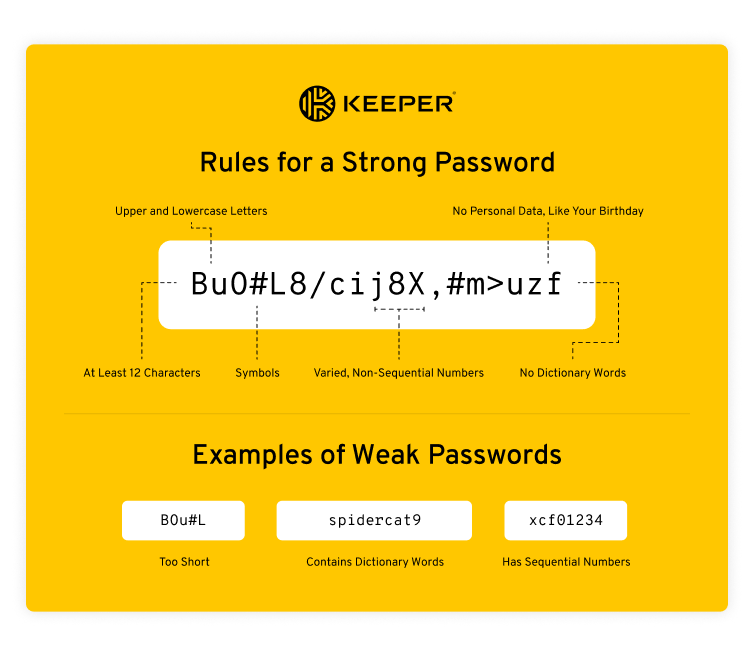A password breach is when a cybercriminal has your password and is able to use it to get into your account. Password breaches can occur due to social engineering and insider threats, but most often, weak password habits are the culprit.
Keep reading to learn more about how passwords get breached, what can happen if your passwords are breached and how to prevent password breaches from happening.
How Do Passwords Get Breached?
Passwords are the keys meant to safeguard your online accounts and the data they contain. They should never be accessed by someone who is unauthorized to do so. Cybercriminals take advantage of individuals who reuse passwords, use weak passwords, click on phishing scams and insecurely store their passwords in order to launch their attacks.
Reusing passwords
One way passwords get breached is through password reuse. Password reuse is extremely common. In fact, 52% of people use the same password for multiple accounts because it’s easier for them to remember one password or several versions of the same password, instead of strong and unique passwords for each separate account. However, this poses a serious risk, because if a cybercriminal gets hold of that one password, they are able to access all of the accounts that you use it for. If a company that you have an account with were to be breached and your password is exposed, cybercriminals can then launch credential stuffing attacks to see if they can access multiple accounts with the same password.
Using weak passwords
Passwords also get breached because they are weak. Any password that is easy to guess or uses a small number of characters that password-cracking software can easily crack is likely to be compromised by cybercriminals. Weak passwords are those that are too short, repeat letters or numbers and use personal information like the year you were born. Avoiding weak passwords, and creating strong and unique passwords for each account, is simple with the help of an online password generator that will create them for you.
Phishing scams
Phishing scams are emails, text messages or phone calls from cybercriminals portraying themselves to be someone they’re not, like a company or family member, to get you to reveal sensitive information. A cybercriminal uses phishing scams to solicit information they can use to compromise your online accounts.
For example, a cybercriminal might send you a phishing email saying to immediately change your password because your account has been compromised. The email may even urge you to click on a link, but clicking that link could take you to a spoofed website that looks legitimate. If you enter your credentials into the spoofed website, you’re essentially handing them over to the cybercriminal.
Insecurely storing passwords
Anytime you store your passwords insecurely, like in a spreadsheet or the notes feature on your phone, you’re placing your accounts at risk of becoming compromised. Storing login credentials in an unencrypted format means cybercriminals can easily gain access to your accounts and any data stored within them.
Insecure password-sharing methods
Password sharing is meant to give others secure access to your account with your approval. However, insecure password-sharing methods like sharing through text messages and email can be easily intercepted by cybercriminals. Furthermore, if a bad actor has physical access to your device, they can see the password in plain text.
It’s important that when you choose to share your passwords, you do so with full end-to-end encryption to prevent your password from being breached. A secure password manager can facilitate this type of secure credential sharing.
What Happens if My Passwords Get Breached?
If any of your passwords get breached, it can lead to a variety of privacy and financial issues that can have serious impacts on your day-to-day life. Data stolen by a cybercriminal can be used to access other accounts, especially if you reuse passwords or variations of them. Password breaches can also lead to cybercriminals blackmailing you or stealing your identity.
Suppose a cybercriminal were to breach your email password and you did not have multi-factor authentication enabled on the account, they may be able to reset the passwords of your other accounts that use the same email address.
How To Know if Your Password Is Breached
The best way to know if your password has been breached is with a dark web monitoring tool. Keeper Security offers a free dark web scan that allows you to check if your data has been stolen and published on the dark web. The dark web is a hidden part of the internet that allows transactions and information to be shared and sold anonymously. It is notoriously used for unlawful purchases, including the selling and purchasing of stolen personal information.
How To Prevent Your Passwords From Being Breached
You can prevent your password from being breached by using a password manager, enabling Multi-Factor Authentication (MFA) and avoiding public WiFi.
Use a password manager
The best way to prevent your passwords from getting breached is by using a password manager. A password manager is a tool that helps you generate, manage and securely store your passwords. Password managers help you ensure that your passwords are always following password best practices and are never being reused across your accounts.
One way passwords get breached is by using personal information when creating a password. For example, using a pet name or the street you live on in your password makes it easy for cybercriminals to guess and gain access to your account. Of course, remembering passwords that have no significance to you can be hard, but that’s where using a password manager helps. With a password manager, the only password you’ll have to remember is your master password.
Enable MFA
Another essential step in increasing your overall online security is to enable multi-factor authentication whenever possible. MFA requires you to use one or more additional methods of authentication to log in to your accounts. Having MFA enabled keeps your confidential information safeguarded from unauthorized access. Even if your passwords were to become breached, a cybercriminal would still be unable to access your account if MFA was enabled, because they wouldn’t be able to authenticate who they are.
Avoid using public WiFi
Avoiding public WiFi can also help prevent your passwords from being breached. When using public WiFi, your data is vulnerable to being intercepted through a Man-in-the-Middle (MITM) attack. A MITM attack is when data being sent between two individuals is intercepted by a cybercriminal. Avoiding public WiFi will mitigate the risk of a MITM attack happening to you.
Stay Safe From Password Breaches
Remember to always use strong, unique passwords that are not easily guessable. To ensure you’re always using strong passwords, use a password manager like Keeper Password Manager. As the world’s most trusted password manager, Keeper can keep your passwords protected from breaches. The user-friendly interface ensures it’s as simple to use and seamless across all of your devices. Start a free 30-day trial today.
Source: Keeper





